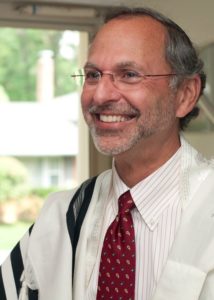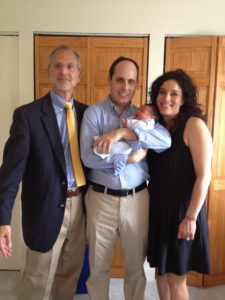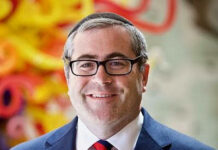A May 2021 Pew Research Center study revealed that younger Jews in the United States were more likely than older generations to migrate to the religion’s extremes; compared to their elders, more American Jews in the 18-49 demographic identified as either Orthodox or of “no particular branch.”
These are also the Jewish generations bringing new Jews into the world and, in naming their babies, they are exhibiting similar trends.
Philadelphia-area rabbis and cantors who officiate at baby-naming ceremonies are seeing parents both rediscover classic names and bring new ones into fashion.

Cantor Mark Kushner is a full-time, certified mohel, as he describes himself. A 2019 Jewish Exponent article on baby naming said Kushner had “multiple decades of experience performing brit milahs and simchat bats,” and estimated that he’d been “involved in the naming of thousands of children.”
Kushner is still active in the area, and he rattled off some of the names he’s been seeing in the past few years.
“Many people are using names like Rebel, Skye and Crew,” he said of the more modern names.
“There’s also, on the opposite, a preponderance of Jacob, Max, Leo,” Kushner added of the more classic names.
A December Kveller article backed up at least half of Kushner’s claim, listing several older, more traditional names among the top selections of 2021. Monikers included Asher, Ezra and Gideon for boys and Abigail, Ava and Eliana for girls.
Babynames.com, which ranks the most popular baby names in the U.S., listed some classic boy names, like Oliver and Theodore, near the top as well, while the girls’ list showed more-modern selections like Luna and Hazel.
Kushner explained that these trends probably come from two emotional places in the minds of parents; they want their kids to stand out and they want a name to offer insight into a child’s, and eventually into an adult’s, personality.
Skye, for example, is a peaceful insight; parents who choose this name hope for their baby to have the quality of a blue sky: relaxed. Kushner has conducted several ceremonies for new babies named Shir, which means song in Hebrew. Those parents probably desire their child to live a life of rhythm, music and happiness.
This kind of symbolism is also an excellent reason not to name your kid Rebel, according to the cantor.
“If you call your child Rebel, be careful what you wish for,” he said.
Rabbi Jonathan Kremer, who leads the Shirat Hayam Congregation in Ventnor, New Jersey, believes that the classic and modern naming approaches are positive. Not only do they show respect for tradition and a desire to be unique, but they also reveal a generation of adults that’s less enamored with popular culture.
Kremer used to see more kids with trendy names, perhaps inspired by celebrities. He mentioned Britney, for Britney Spears, and Lindsay, for Lindsay Lohan, as two examples that he remembered from 10 or more years ago.
But in the past decade, the rabbi has seen everything from Brooklyn for a girl to Erez, meaning cedar tree, for a boy, to biblical options like Rachel and David.
“You can’t escape popular culture if you’re online,” Kremer said. “But my impression is parents are pushing away from that and letting their hearts be their guide.”
Rabbi Aaron Krauss, who guides Beth El Synagogue in Margate, New Jersey, agrees with Kremer that these developments are for the better.
In particular, Krauss is happy to see traditional and even biblical names making a comeback.
Parents who use Jewish-sounding names are confident in their Jewishness, according to the rabbi. They are also a stark contrast to their ancestors who, in an understandable effort to assimilate, chose names that didn’t sound as Jewish.
Today, in a society with more intermarriage than it used to have, even “the non-Jewish partner seems to be comfortable with a Jewish name,” said Krauss.
“It’s a step in the direction of people feeling more comfortable with their Jewishness,” he added.

No matter what the modern trends are, though, Jewish naming practices continue to take on timeless qualities, according to local rabbis.
First and foremost, there’s a divine inspiration, they say.
A couple of months ago, Rabbi Moshe Brennan of the Chabad of Penn Wynne and his wife did not know what to name their newborn son. So before leaving the hospital, Brennan wrote Nehenya, meaning comfort, on his son’s form.
Ten days later, Brennan’s cousin, who was doing some research on their great-grandmother, sent him a picture of their great-grandmother’s grandfather’s grave. It said Mordecai, son of Nehenya.
“It was a name in the family,” the rabbi said. “No one else in the family for five generations.”
“You’re going to pick a name and you feel and think you’re making the choice,” he added. “But it’s simply being revealed to you.”
There’s also a more conscious element, according to Rabbi Abe Friedman of Temple Beth Zion-Beth Israel in Philadelphia.
Often, parents will tell Friedman before a naming ceremony that they picked a moniker to honor a relative. The rabbi will respond by asking them to think about why they wanted to honor that relative, and then to explain those reasons to the child in a letter they read aloud during the ceremony.
By the time they stand up to speak, they understand what stories, qualities and lessons they want to pass down from the elder to the child.
“I think parents are very aware of what they’re choosing,” he said. “This name is a container of meaning.” JE






